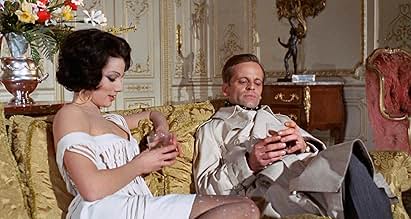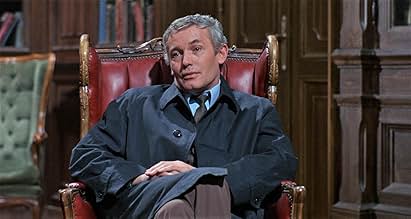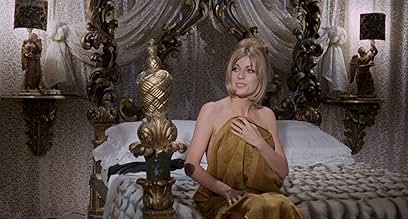Adicionar um enredo no seu idiomaAfter a businessman's unfaithful wife is seemingly killed in a car accident, he is led by several unscrupulous characters to believe that she is actually alive.After a businessman's unfaithful wife is seemingly killed in a car accident, he is led by several unscrupulous characters to believe that she is actually alive.After a businessman's unfaithful wife is seemingly killed in a car accident, he is led by several unscrupulous characters to believe that she is actually alive.
- Direção
- Roteiristas
- Artistas
- Horserace Spectator
- (não creditado)
- Horserace Spectator
- (não creditado)
- Man at crashed car
- (não creditado)
- Policeman
- (não creditado)
Avaliações em destaque
Klaus Kinski being cast against type is certainly quite memorable, but when I think of this film I mostly recall the special effects for the train crash. Or rather the lack of them! Although the moment is brief it is blatantly obvious that we have a crash of a model train, and even more clearly a burning model train. This is the special effects school of early Japanese Godzilla movies!
Well actually, no. Kinski is at the most restrained I've ever seen him. That powerhouse of rolling eyes and bared teeth is subdued and on his best behaviour - or as much as you can be given the circumstances. It's strange seeing Kinski in the Edwidge Fenech/Dagmar Lassandra role (Nora Orland's incidental score has definite echoes of his subsequent work on 'The Strange Vice of Mrs Wardh', starring Fenech in the titular role).
A fairly standard giallo, which has moments of great interest - usually involving Kinski.
Distinguishing Liz and Helen, however, is its Swinging London setting, complete with a disorienting visit to a hippie dance club with colored lights, topless birds, motorcycles, and psychedelic music. The attentive viewer will be further unsettled by the questionable motivation of its protagonist, straight-laced but tortured industrialist John Alexander, played by a simmeringly earnest Klaus Kinski.
The production values aren't consistently impressive. In one scene Kinski pretends to be pummeled by people clearly not in the same room, and the English actor who dubs the lead is laughably un-Kinski. Still, Liz and Helen does more than compensate for its shortcomings with mood and stylistic flair. Recommended to the open-minded and those wanting to see Kinski do something other than glare crazily, eat bugs, and kill people.
I really think "Double Face" fits neatly into this second giallo-category, although admittedly the trademarks are turned upside down. Here, it's the male protagonist - Klaus Kinski - who's being cheated on by his wife (with another woman, moreover) and driven insane. It's a highly unusual role for Kinski, but he's absolutely splendid as John Alexander who suspects that his wife Liz still hangs out in sex clubs and appears in pornographic movies, even though she supposedly died in a horrible car accident. The plot is a little thin to full a complete film with, so "Double Face" is overall rather dull and contains too much pointless padding footage. The climax is tense and fairly surprising, though, and the cast is full of beautiful people! Kinski's charisma and grimaces are indescribable, and the male spectators are spoiled with no less than three gorgeous women: Christiane Krüger, Annabella Incontrera and Margaret Lee. If you're still not convinced, I can also add that the idea for the story comes from the almighty Lucio Fulci! Check it out, Italian cult-cinema lovers!
On a less relevant note: watching the DVD-version that I own was an adventure to itself. It was a restored version, so poor quality footage constantly interchanged with high quality images, and the spoken language randomly switched back and forth between English, German and French.
Você sabia?
- CuriosidadesThough not an adaption of original material by Edgar Wallace, this film was advertised in Germany as part of the famous Edgar Wallace Series. It was such a huge flop that the producers at Rialto Film decided to delay any future plans to do further Wallace films. Due to the great success of Dario Argento's O Pássaro das Plumas de Cristal (1970), which was advertised as an adaption of a story by Wallace's son Bryan Edgar Wallace, Rialto's series re-started in 1971.
- Erros de gravaçãoWorst Dubbing Ever! Voices are heard on the audio while the actors are seen to be silent on screen, then flapping their mouths soundlessly on screen to silence in the audio.;
- Citações
Liz: I knew your plan wouldn't work! You son of a bitch! If it wasn't for the inspector he would have killed me! And all because you wanted to grab your stepdaughter's money and become the real head of the company! Damn you! I told you you couldn't make this work!
Mr. Brown: You slut! I knew I couldn't trust you!
- Versões alternativasNudity removed for US television screenings not restored to video. Rerelease in France had new sex footage featuring Alice Arno added.
- ConexõesEdited from O Homem do Olho de Vidro (1969)
- Trilhas sonorasNon Dirmi Una Bugia
(Don't Tell Me a Lie)
Written by Nora Orlandi (uncredited)
Sung by Nora Orlandi (as Silvie St Laurent)
Principais escolhas
- How long is Double Face?Fornecido pela Alexa
Detalhes
- Tempo de duração
- 1 h 28 min(88 min)
- Mixagem de som
- Proporção
- 1.85 : 1































